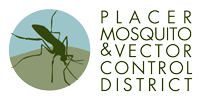ROSEVILLE, Calif., – Placer County’s health officer, along with the Placer Mosquito and Vector Control District, continue to encourage residents to take preventative steps that will reduce their risk of acquiring mosquito-borne illnesses. Since the first 2025 detection of West Nile virus in Placer County in June, the District has detected the virus in 5 dead birds and in 129 mosquito samples. The county’s first human case of West Nile virus in 2025 was reported in a Lincoln resident this week.
West Nile virus is a potentially serious illness transmitted through the bite of a female mosquito and there is no cure. “Many people infected with West Nile virus don’t even realize it or only feel mild effects,” said Dr. Rob Oldham, the county’s health officer. “But for a small number — about 1 in 150 — it can be very serious. That’s why preventing mosquito bites is so important.”
During the summer, the District traps and tests mosquitoes for West Nile virus weekly throughout Placer County. These test results are used to assess the risk of West Nile virus transmission to people, inform the public and make preventative or responsive vector control treatments in the most effective way possible to protect Placer residents.
“Our extensive surveillance efforts provide timely data that informs our treatment schedules. These are evaluated and carried out on a weekly basis,” said District General Manager, Joel Buettner. “We encourage residents to protect themselves using simple tips: use an EPA-registered repellent to protect themselves from mosquito bites, drain any standing water on their property to prevent breeding, and contact us if needed.”
Although human cases are reported weeks after the onset of symptoms in patients, the risk for West Nile virus transmission to humans in Placer County remains high. The Mosquito and Vector Control District and the County Public Health Department anticipate there will be more human cases reported as we enter fall. Officials recommend that people prevent exposure to mosquito bites and West Nile virus by practicing the “three Ds”:
- DUMP AND DRAIN – Mosquitoes lay their eggs on standing water. Eliminate all sources of standing water on your property, including flowerpots, old car tires, rain gutters and pet bowls. If you know of a swimming pool that is not being properly maintained, please contact the district at 916-380-5444.
- DEET – Apply EPA-approved insect repellent containing DEET, picaridin, oil of lemon eucalyptus or IR3535 according to label instructions. Repellents keep the mosquitoes from biting you. DEET is safe for use on children when used as directed. Mosquitoes that can transmit West Nile virus typically bite in the early morning and evening, so it is important to wear proper clothing and repellent if outside during these times.
- DISTRICT – Contact the District for any additional help controlling mosquitoes around your home.
For more information about West Nile virus, visit the state of California’s website on West Nile. Residents are encouraged to report all dead birds on that website or by calling toll-free 1-877-WNV-BIRD (968-2473).
###






